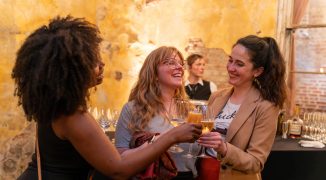Last month, we published a feature about the struggles of depression and alcoholism that are endemic, yet oftentimes unrecognized, in our industry. The story, which included Dead Rabbit partner Jack McGarry’s account of his own personal journey toward recovery, struck a chord with bartenders, bar owners, and other members of the industry around the globe. So, two weeks ago, we invited Jack for an “Ask Me Anything”-style live discussion about his experiences with depression and alcoholism, how he’s turned his life around, and what he feels the industry can do to help bartenders grappling with similar problems.
“I’m not professing to be a professional; I’m still figuring it out,” he says. “But it seems like the industry, as well, is still figuring it out. And we’re doing really well in the sense of having intellectual, intelligent conversations about misogyny and sexual abuse and that type of stuff, so I feel like it’s very much the time to have the conversation about alcoholism and broader mental health issues in the industry.”
Read on for a few of the most insightful moments from Jack’s discussion, and be sure to watch the full video discussion here.
On bringing it up with your coworkers and managers
I didn’t really have to talk to anybody, because everyone who knew me knew there was an issue. It was difficult at the beginning, but for me, and this is something I’ve heard from a lot of alcoholics: they have to hit their version of rock bottom for them to really understand that there’s a problem. For me, the problem was alcohol — it was the driving factor behind all of my problems, because if I got really down, I would’ve went out and drank the point where I couldn’t remember. The last time I did that, it resulted in me being in the hospital for a week or so. So when I was in the hospital, everybody knew about it, and when I came out, I just had to hold my hands up and say that I have a problem, and I need time to address it and fix it. Everyone has been extremely understanding and supportive, overwhelmingly so.
A lot of people, staff included, have come to me and asked questions, and scrutinized their own situations. I think you just have to be open about it. I think you just have to be aware that it’s there, aware that it’s something legitimate, and just try to be there for your team and talk to them. I know this is something that isn’t a given, and that’s something we’re very much trying to work on, but if we can maybe help one person and that person can help someone else, it has that type of domino effect.
On how he continues to guide menu development without drinking
This is something I’ve really had to work on, and struggle with. Part of my core identity, I feel, is cultivating world-class programs. I don’t mean that in an egotistical perspective, but I really strive to create great programs with the team that we have here [at Dead Rabbit] and the team that we have at Black Tail. But I’ve had to completely reshape the way that I do that. Dead Rabbit, before we opened, we worked on the program for two years, developing the recipes for about 10-11 months. That was at the point where I would’ve made drinks like 70 times to get them right. After the 30th or 40th time, you probably can’t remember a lot of it.
[Since then] we’ve had people like Jillian [Vose] come onboard, and she’s much more responsible for the day-to-day activities of organizing the research and development — I essentially come in at the end of the process to bless the drink. So I’m not involved with the start of it, and when I do taste, it’s a spit taste. I very, very rarely take a sip, because I know if I take a sip, it can trigger drinking. It’s something I’m very, very careful of. I don’t try neat spirits. Spitting and using my sense of smell more, and making sure you’ve got a structure in place for when you do taste. I never want to go backwards to where I was; I don’t want to let down the people who I’ve regained their trust or respect. You just need to be super focused and disciplined with it.
On whether bars should have a no-drinking policy for staff
It’s something we’ve wrestled with quite a bit at Dead Rabbit and Black Tail. When Dead Rabbit opened, I would’ve been part of that drinking, and obviously being in a leadership position, a lot of the staff would’ve felt it was normal to drink that way. At Dead Rabbit, […] the way we hire and operate here is we don’t micromanage, we hire the right people and we hold them accountable for the standards that we set under a fairly tough training regimen. That’s the culture we have here. At Black Tail, we’ve started with a no-drinking policy, and it’s something I believe we’ll probably gravitate more toward in the future. When they’re off, they can come in, and they can certainly have a drink, but [not] after work or during work — particularly because the team is so young and the environment and culture are still developing. I believe that this industry you have to have an awful lot of focus and discipline, and to do that, drinking isn’t really coherent with that.
At the end of the day, you’re responsible for people. We just received an email from a member of the staff that had to cut three people off at Black Tail, and that’s from someone who doesn’t drink. If they were drinking, that could’ve potentially clouded their judgment and give that person one more drink, and one more drink is the difference between walking down a set of stairs safely, and not walking down a set of stairs safely. So I think it’s something that needs a bit more attention.
On whether alcoholic bartenders should change careers
I believe if people commit themselves to [recovery], proximity isn’t an issue. At the end of the day, if you want to drink, there’s a bar on every corner. If you want to drink, you’re going to drink. Alcohol is so socially acceptable, and that’s maybe part of the issue.
On how to help a friend or colleague who’s struggling
It’s very tough. I was watching a TED Talk on being around people that have addiction and mental health issues, and the big thing this guy said in particular was just connection. A lot of time when you’re going through this stuff, you’re feeling disconnected. You feel like nobody’s there for you or you’re not worthy of people’s time or you’re just useless. So I feel like the biggest thing you can do is just be there for the person, whether that’s being in their apartment or going out for coffee or going to the movies. As people have told me, and I can see it as well with my sober network, being around people who are going through hard times, it’s very difficult. But I’ve kind of gotten to the point now where I prefer hard-hitting conversation, and meaningful conversation, over the fluff of nonsense stuff. Connection is the most important thing, because when you’re going through depression or drinking, you’re isolating yourself more and more. It’s ironic, because for that person, the thing they want the most is that connection, but they’re putting themselves further and further away from it.
On navigating social situations in recovery
It’s something you need to be very careful of. When I went through this the first time, I got non-alcoholic beers in all the bars. Different things trigger different people, so for me, going back to non-alcoholic beer — in AA, it’s not promoted that you do that, because you’re seriously testing yourself by doing so, by putting yourself so close to it. It’s something that can put you very close to relapse. When it comes to non-alcoholic cocktails, when I go into bars now, because my foundation is a great deal stronger than when I started, I wouldn’t have any problem with having a non-alcoholic ginger ale or lemonade. I know for some people that doesn’t work as well because it puts them in that mindset. Some people see a martini glass and it triggers them. Some of these things, like depression and alcoholism, aren’t as defined [with the rules of what you can and can’t do] — each case is unique, so you have to take it on a case-by-case perspective and really go to the meetings and speak to your therapist. You just have to see what works for you and what doesn’t work for you. For me, a big no-no would be non-alcoholic beer because you’re putting yourself far too close to relapsing again.
On how his colleagues have reacted to his recovery
It’s been extremely positive. I was expecting some negative consequences from being so open about it, but everyone’s been extremely receptive, and I believe that ties into [the fact that] the industry is mature enough to have this type of conversation. When you’re going through these things, you always feel like you’re unique and no one else will understand. The more you get into this, the more you realize that’s just not true. People have been extremely encouraging. Most people gave me the space that I needed to recover, like when there were obligations I’d made to travel: once I told people what was going on, they were extremely understanding. One of the biggest roadblocks for me was letting people down, [but] when you’re truthful and honest about what’s going on, you can really start to begin your road to recovery. It was difficult, but at the same time, it’s been extremely rewarding, and everyone’s been very, very positive.
On how the hospitality industry can help
I think we’re at the beginning of this type of conversation. In this industry, there are a lot of intelligent people, and we can begin to have this type of dialogue about what will help and what will not help. I think the biggest thing that people can have is the dialogue and the openness, because that’s what’s helping me. When I came out of the hospital, my big thing was that I’ve been very fortunate to be in the industry spotlight quite a bit, and I’ve enjoyed that, but I needed to use that to maybe open some doors for other people who are struggling or couldn’t talk about it, because that’s how I felt. I didn’t feel like there were the right resources there for me to reach out to and get better, but I know there are people in the industry looking to do things [with building resources]. I believe there will be a lot of great stuff to come out of just the fact that we’re having this conversation.
On the parallels between his success and his rate of drinking
It was more the workload [than the success], and the way I was thinking about things — my thinking was fundamentally flawed. I wasn’t thinking right, I wasn’t thinking rationally or realistically, I was living in my own reality. With being sober now, the success obviously, thankfully hasn’t changed — we’ve opened another bar recently and we’re going to be looking to further expand our company in the next few years, but my thing was the workload and escaping from it. The more work there was, the more work there was that needed to be escaped. The workload’s still there, and it’s not going to go away, but it’s just me being significantly more mature, realistic and rational, and talking to people about what I’m going through. It’s okay not to be okay sometimes. The success is still there and I hope it’s still there going forward, because we’ve got a great bunch of people here and I feel like we’re only getting started, but removing the drink from the equation has made me much more effective. It’s just something I needed to do.
On how it’s affected his friendships
I think ‘friends’ is a term that’s bandied around with too much frequency in this industry. A lot of it is enabling; you’re surrounding yourself with enabling people so you can feel comfortable with the level that you drink or [use drugs]. In regards to friends, I don’t feel like I’ve lost any, but I don’t spend time with people I know would be potentially triggering for me getting into a relapse situation, so I’m very careful with who I spend my time with. Everything has to be very structured and organized to make sure my sobriety is front-and-center at all times. I’m not aware of losing anybody but the one thing I’ve noticed is that my life’s gotten a lot fuller, with people who want to help.
On his newfound love for running
When you’re on a run and it’s just you and your thoughts, and your mind is constantly telling you to stop, and that you’re not good enough, you have to combat that the whole time. That’s why I’m a big fan of running and running long distances, because you’re essentially re-training your brain with how you think about things. There’s no better time to do that than when you’re out running and spending that amount of time by yourself.
On resources like therapy and Alcoholics Anonymous
Therapy, for me, is like working out for your mind. You go, you talk about situations you’ve had in the past and how you dealt with them, and the therapist is just there to kind of help you point out flaws in your thinking. That’s more what therapy’s about, just really trying to work on character traits, where AA for me is just to remind myself that I’m an alcoholic and I have a problem. I try to go to 2-3 meetings a week. Sometimes I succeed and sometimes I don’t succeed, but for me, it’s important to go just to hear other people who are struggling with their day-to-day stuff and remind myself that there’s stuff going on. And there are people who remind you of your toolkit. They’re very different, for me you can’t do one without the other, I have to be doing both.





